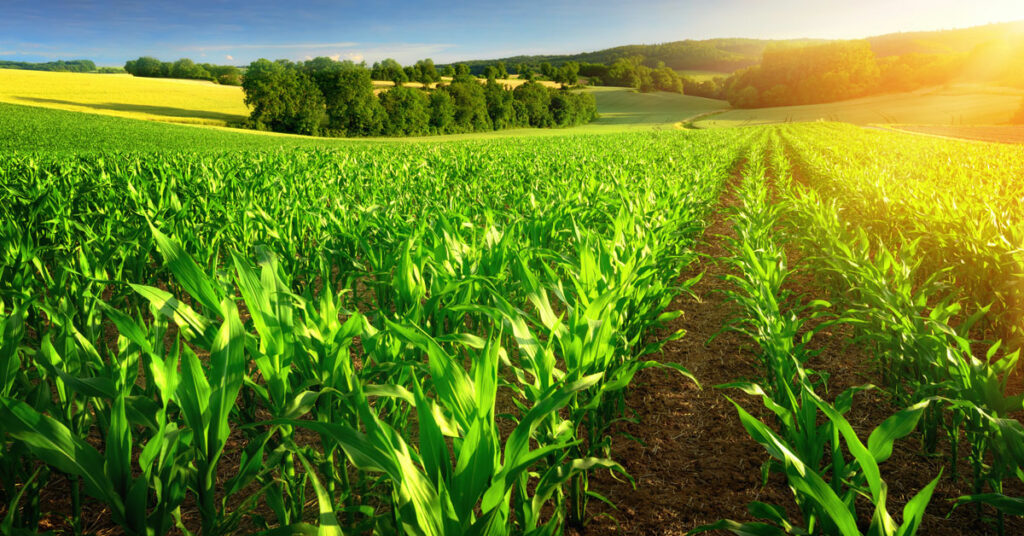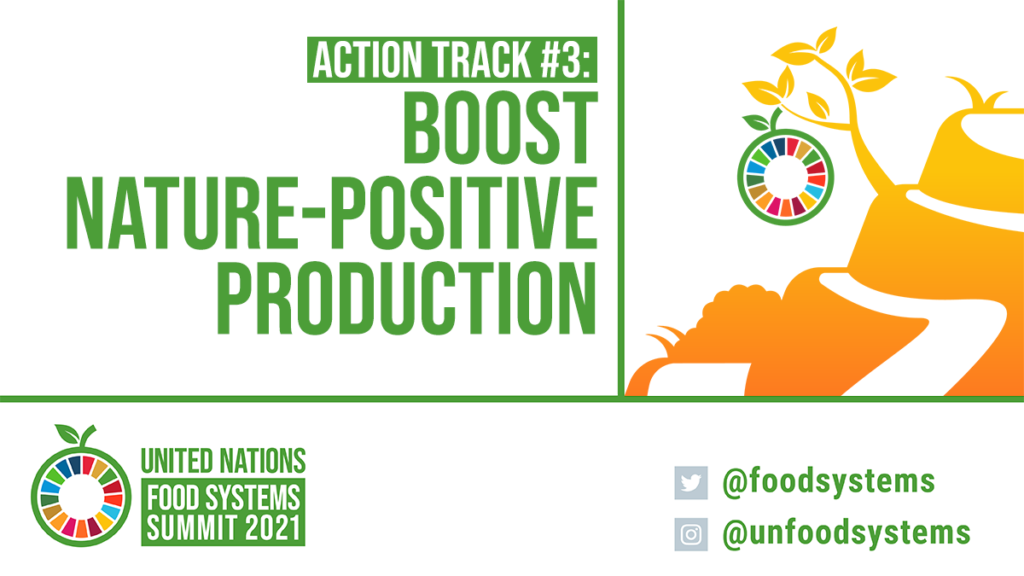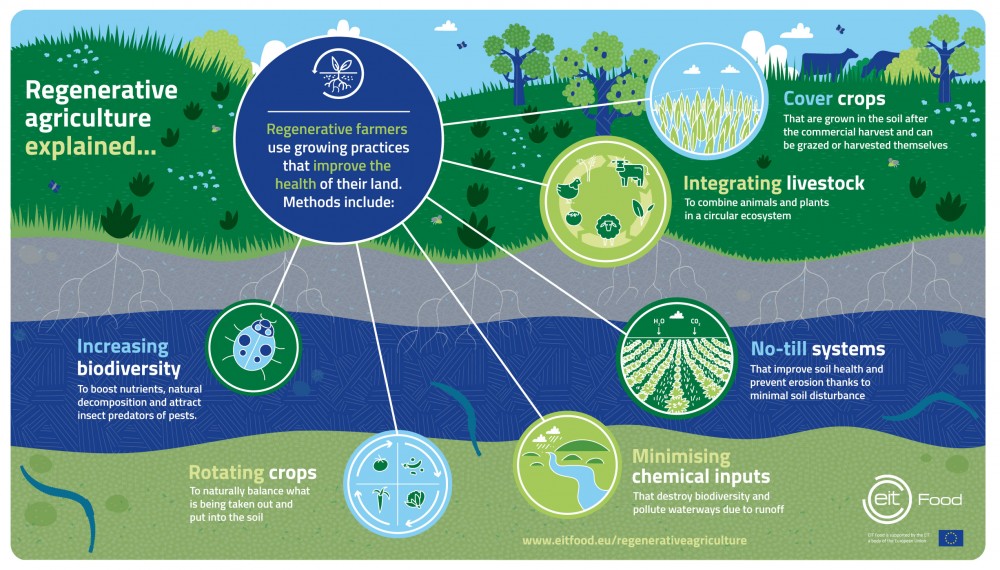
The Food Systems Summit in 2021 will be a chance for the UN to assess progress on the delivery of the 17 SDG’s previously outlined in 2015, and develop an overall aim towards 2030. The summit will be the beginning of new bold actions and ambitious goals as they make plans to transform our food systems towards more equitable and sustainable processes. There are five main action tracks which are at the heart of the summit’s priorities and furthermore goals. These include;
- Action Track 1: Ensure access to safe and nutritious food for all
- Action Track 2: Shift to sustainable consumption patterns
- Action Track 3: Boost nature-positive production
- Action Track 4: Advance equitable livelihoods
- Action Track 5: Build resilience to vulnerabilities, shocks and stress

Action Track 3, comprises of goals and actions that aim achieve adequate food production for our growing population through the use of our world’s environmental and biological resources appropriately. Goals specific to action track 3 prioitize reductions in; biodiversity loss, pollution, excessive water use, soil degradation and greenhouse gas emissions. These are all components which are all common trade-offs of conventional farming which has left our food systems unsustainable in many parts of the world. This action track aims to revaluate the food value chain, to get fair and equal opportunities for smallholder farmers and enterprises who are currently struggling, whilst lessening some of the burdens which they face on a daily basis. I feel that reducing environmental impacts from food production is one of the most critical actions that must be persued. Organic farming may prove to be the most appropriate and suitable innovative technique to make major sustainable contributions towards achieving the goals of this action track.

Organic farming uses all of the above regenerative agriculture techniques to ensure good land health and high levels of productivity, whilst ensuring biodiversity is retained and environmental harm is minimised. The reduced costs from organic farming along with premium prices obtained for organic produce, means that it can provide a sustainable livlihood for many smallholder farmers. Many of these who are from developing countries already have limited access to resources such as chemical fertilisers, pesticides, and herbicides, thus organic farming is a viable option for them (Jouzi et al., 2017).
Crop rotation is a practice which is one of the fundamental parts of organic tillage farming as it has several benefits to maintaining good soil health and overall crop performance. Using practices such as minimal disturbance of soil for cultivation is perceived to be one of the main challenges which faces organic farming as many believe it may limit achieving high yields in certain crops. However, studies show that implementing shallow non-inversion methods of cultivation, resulted in no declines in yields, when compared to deep inversion tillage methods. Further issues regarding weed infestations of crops were deemed to have limited effect in these trials using shallow non-inversion methods of cultivation on organic farms. The incorporation of crop residues into the soil and the use of cover crops, can add to the carbon stock of soils which helps to increase the organic matter content and overall soil quality (Cooper et al., 2016).
Further studies of organic farming show some farmer health benefits associated with this method of farming. The use of pesticides in conventional farming was linked with genotoxicity and genetic damage in some farmers who were exposed to such pesticides. These studies show how organic farming can reduce the risk on human health from a farmer’s perspective, compared with conventional farming (Costa et al., 2014). Furthermore the consumption of food grown organically can be healthier for human consumption according to some reports. The risk of allergic diseases and obesity can be lessened with the consumption of organic food compared with conventional foods in some circumstances. Residues of pesticides found in certain conventionally grown fruits and vegetables poses adverse effects on human health, especially on children’s development (Mie et al., 2017).
References:
Cooper, J., Baranski, M., Stewart, G., Nobel-de Lange, M., Bàrberi, P., Fließbach, A., . . . Mäder, P. (2016). Shallow non-inversion tillage in organic farming maintains crop yields and increases soil C stocks : a meta-analysis. Agronomy for sustainable development, 36(1), 1-20. doi:10.1007/s13593-016-0354-1
Costa, C., García-Lestón, J., Costa, S., Coelho, P., Silva, S., Pingarilho, M., . . . Teixeira, J. P. (2014). Is organic farming safer to farmers’ health? A comparison between organic and traditional farming. Toxicology letters, 230(2), 166-176. doi:10.1016/j.toxlet.2014.02.011
Jouzi, Z., Azadi, H., Taheri, F., Zarafshani, K., Gebrehiwot, K., Van Passel, S., & Lebailly, P. (2017). Organic Farming and Small-Scale Farmers: Main Opportunities and Challenges. Ecological Economics, 132, 144-154. doi:10.1016/j.ecolecon.2016.10.016
Mie, A., Andersen, H. R., Gunnarsson, S., Kahl, J., Kesse-Guyot, E., Rembialkowska, E., . . . Grandjean, P. (2017). Human health implications of organic food and organic agriculture: a comprehensive review. Environmental health, 16(1), 111-111. doi:10.1186/s12940-017-0315-4